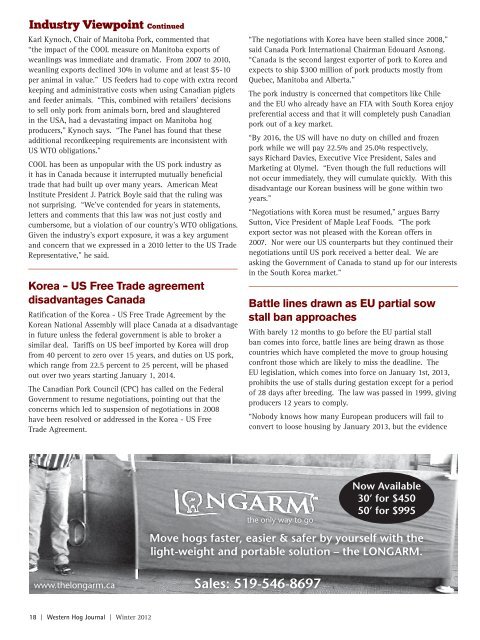Create successful ePaper yourself
Turn your PDF publications into a flip-book with our unique Google optimized e-Paper software.
Industry Viewpoint Continued<br />
Karl Kynoch, Chair of Manitoba Pork, commented that<br />
“the impact of the COOL measure on Manitoba exports of<br />
weanlings was immediate and dramatic. From 2007 to 2010,<br />
weanling exports declined 30% in volume and at least $5-10<br />
per animal in value.” US feeders had to cope with extra record<br />
keeping and administrative costs when using Canadian piglets<br />
and feeder animals. “This, combined with retailers’ decisions<br />
to sell only pork from animals born, bred and slaughtered<br />
in the USA, had a devastating impact on Manitoba hog<br />
producers,” Kynoch says. “The Panel has found that these<br />
additional recordkeeping requirements are inconsistent with<br />
US WTO obligations.”<br />
COOL has been as unpopular with the US pork industry as<br />
it has in Canada because it interrupted mutually beneficial<br />
trade that had built up over many years. American Meat<br />
Institute President J. Patrick Boyle said that the ruling was<br />
not surprising. “We’ve contended for years in statements,<br />
letters and comments that this law was not just costly and<br />
cumbersome, but a violation of our country’s WTO obligations.<br />
Given the industry’s export exposure, it was a key argument<br />
and concern that we expressed in a 2010 letter to the US Trade<br />
Representative,” he said.<br />
Korea – US Free Trade agreement<br />
disadvantages Canada<br />
Ratification of the Korea - US Free Trade Agreement by the<br />
Korean National Assembly will place Canada at a disadvantage<br />
in future unless the federal government is able to broker a<br />
similar deal. Tariffs on US beef imported by Korea will drop<br />
from 40 percent to zero over 15 years, and duties on US pork,<br />
which range from 22.5 percent to 25 percent, will be phased<br />
out over two years starting January 1, 2014.<br />
The Canadian Pork Council (CPC) has called on the Federal<br />
Government to resume negotiations, pointing out that the<br />
concerns which led to suspension of negotiations in 2008<br />
have been resolved or addressed in the Korea - US Free<br />
Trade Agreement.<br />
www.thelongarm.ca<br />
18 | Western Hog Journal | Winter 2012<br />
“The negotiations with Korea have been stalled since 2008,”<br />
said Canada Pork International Chairman Edouard Asnong.<br />
“Canada is the second largest exporter of pork to Korea and<br />
expects to ship $300 million of pork products mostly from<br />
Quebec, Manitoba and Alberta.”<br />
The pork industry is concerned that competitors like Chile<br />
and the EU who already have an FTA with South Korea enjoy<br />
preferential access and that it will completely push Canadian<br />
pork out of a key market.<br />
“By 2016, the US will have no duty on chilled and frozen<br />
pork while we will pay 22.5% and 25.0% respectively,<br />
says Richard Davies, Executive Vice President, Sales and<br />
Marketing at Olymel. “Even though the full reductions will<br />
not occur immediately, they will cumulate quickly. With this<br />
disadvantage our Korean business will be gone within two<br />
years.”<br />
“Negotiations with Korea must be resumed,” argues Barry<br />
Sutton, Vice President of Maple Leaf Foods. “The pork<br />
export sector was not pleased with the Korean offers in<br />
2007. Nor were our US counterparts but they continued their<br />
negotiations until US pork received a better deal. We are<br />
asking the Government of Canada to stand up for our interests<br />
in the South Korea market.”<br />
Battle lines drawn as EU partial sow<br />
stall ban approaches<br />
With barely 12 months to go before the EU partial stall<br />
ban comes into force, battle lines are being drawn as those<br />
countries which have completed the move to group housing<br />
confront those which are likely to miss the deadline. The<br />
EU legislation, which comes into force on January 1st, 2013,<br />
prohibits the use of stalls during gestation except for a period<br />
of 28 days after breeding. The law was passed in 1999, giving<br />
producers 12 years to comply.<br />
“Nobody knows how many European producers will fail to<br />
convert to loose housing by January 2013, but the evidence<br />
the only way to go<br />
Move hogs faster, easier & safer by yourself with the<br />
light-weight and portable solution – the LONGARM.<br />
Sales: 519-546-8697<br />
Now Available<br />
30’ for $450<br />
50’ for $995




